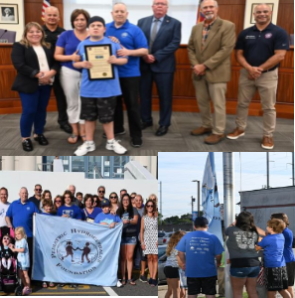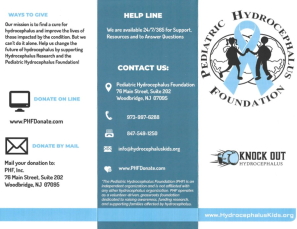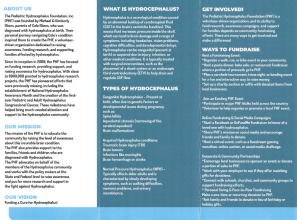Rootstown girl chosen as national face of incurable brain condition
April 20, 2012 by PHF Filed under Uncategorized
ROOTSTOWN TWP.: It’s not immediately obvious what national group would ask Mackenzie Holcomb to be “the face” of its new awareness campaign.
Maybe the “I Love To Shop” preteen movement. Or “Spunky 11-Year-Olds Unite!” Or even “Operation: Spring Dance? I’m So There.” But the Pediatric Hydrocephalus Foundation? Not a chance. And yet … Hidden below her skin is a tube that runs half the length of her body, carrying excess spinal fluid from her brain to her stomach. Her outgoing personality and unfettered smile belie the fact she has undergone six brain surgeries in four years. “It doesn’t stop me from doing anything,” Mackenzie said, though she acknowledges walking more carefully to avoid potential falls. Mom admits to worrying enough for the two of them. “I worry from the time she walks out that door till the time she’s home,” Amy Gyure said of her only child. “And with her getting older and wanting to do more things …” Mackenzie playfully interrupted: “Hey, I’m getting a life!” For the next year, that life will include her photo in ads, media interviews and chatter on social media sites on behalf of the Pediatric Hydrocephalus Foundation, which chose Mackenzie’s name at random, along with 2-year-old Jaden Brown of Colorado, to represent the boys and girls who share an incurable condition. Creating awareness Hydrocephalus is more commonly known as “water on the brain.” Even so, there are probably few nonsufferers who know what that means. That’s the point of the first “National Face of Hydrocephalus Awareness” campaign, spokesman Michael Illions said. “Our hope is to shed some light on this condition and the struggles children and adults have as they face the constant threat of surgery,” Illions said. Mackenzie unwillingly joined their number — 1 million in America — when she was 8 years old. Her parents had noticed tremors in her hands. Doctors found two gliomas, or brain tumors, on her brainstem and her left optic nerve. The one on the brainstem had caused hydrocephalus, meaning it had stopped excess spinal fluid from making its normal exit through the brainstem. In babies with soft skulls, the fluid can build up and cause large deformations. In older children, like Mackenzie, the skull stays put and the pressure builds within. To release the fluid, Mackenzie had a tube inserted into her brain through a hole drilled in the skull. The tube was fed beneath the skin down the back of her head and neck, past her chest and into her stomach. For some lucky folks, the drama ends there. Others face a lifetime of surgeries to repeatedly clean out the tube. So far, Mackenzie has made that trip five times. Severe headaches, vomiting or mild delirium are signs that alert her parents to trouble. Ask about her many surgeries and Mackenzie shrugs. No big deal. She’s used to it, she will tell you. But her mom and her dad, Gary Holcomb, remember those moments a bit differently. They usually were preceded by tears and repeated questions of “why me?” Her parents could offer no answer. “You go from having a perfectly healthy child and all of a sudden, you have neurologists and surgeons and cancer doctors,” Gyure said. “Cancer doctors?” Mackenzie said, stopping her mother. “I have cancer?” “You have two tumors,” Gyure told her. “That’s what a tumor is?” Mackenzie asked as her mom nodded. “Well, I guess I still have a lot to learn.” The tumors are being watched closely, Gyure said, but “they don’t want to mess with them.” Winning the competition At least for now, Mackenzie’s illness will offer a more positive distraction. She didn’t even know her mom had entered her into the competition, and frankly, Gyure figured it was such a long shot, she barely gave it another thought after submitting the entry. When the foundation called to say Mackenzie’s name was chosen from a pool of 160 children, “it was like winning the lottery,” Gyure said. On a national level, the campaign mostly will take place on the Internet, through websites and social media, Illions said. The stories of Mackenzie and Jaden also will be used when the foundation visits Washington, D.C., to meet with congressional representatives who approved September as Hydrocephalus Awareness Month. Meanwhile, the pair will be featured in print ads in their home states. In return, Mackenzie and Jaden will be treated to a professional photo session and have $500 donated in each their names to a hospital of their choice for hydrocephalus research. Gary Holcomb said he hopes awareness will help raise money for new research. “They’ve been doing the same treatment since the 1960s,” he said. Whatever the treatment, it is something Mackenzie will never escape. “This is a life deal,” Gyure said, “but hopefully she will have a long, normal life.”
 Read more at: https://html.com/attributes/img-width/>
Read more at: https://html.com/attributes/img-width/>



























Comments?